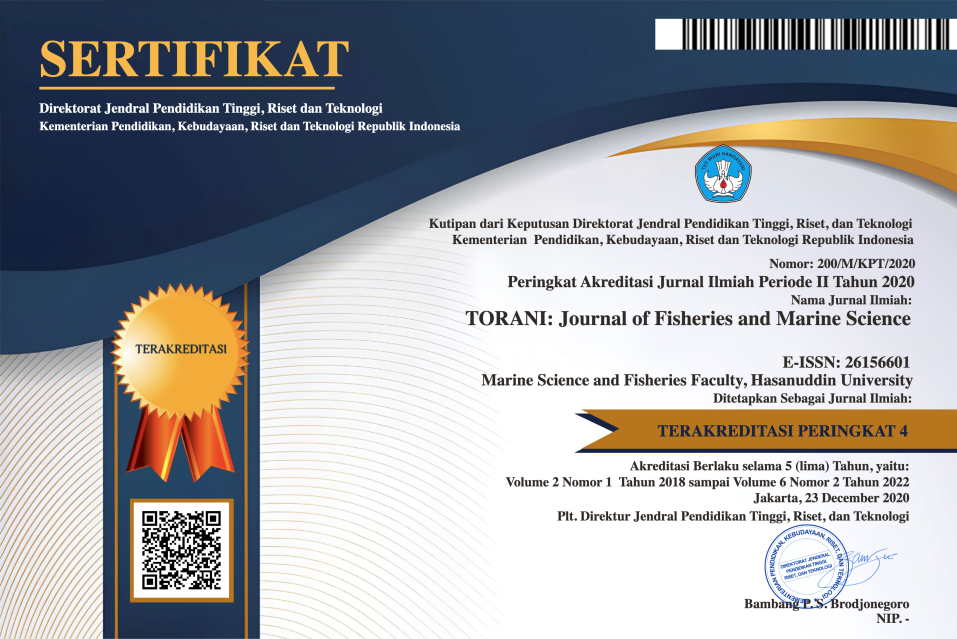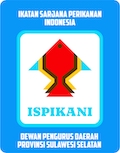IDENTIFIKASI BEBERAPA SPESIES RUMPUT LAUT YANG POTENSIAL DIBUDIDAYAKAN DI PERAIRAN SULAWESI SELATAN
DOI:
https://doi.org/10.35911/torani.v26i1.2620Abstract
Indonesia has a long costline dan have a high natural fisheries resources. One of natural resources from the
coast area is seaweed. Seaweed is export commudity from fisheries sector and Indonesia is one of the third
main producer for seaweed in the world. Seaweed species that have been cultured and utilized was only
several species such as Glacillaria sp, Euchema cottoni and Geledium sp, on the other hand, Indonesia has a
high diversity of seaweed. Based on LIPI data survey on 1998, it was found that 55 species of seaweed at
Indonesian waters. Through this data, it showed that Indonesian water has a high potency for seaweed
culture development. Aims of this study were to identify seaweed species that has a high potency to be
cultured at South Sulawesi’s waters and to analyse natural potency of several seaweed species that can be
cultured. Results study showed that diversity of seaweed species was varied within South Sulawesi’s waters.
The highest number of species account for 30 species that found at Pangkep waters and the lowest number of
species was found at Bone waters account for 5 species. There were three class of seaweed that found from
locations, such as Red, Brown and Green algae. The highest number of species from Red algae class was
found from Bantaeng waters, furthermore the highest number of species from brown algae class was found
from Pangkep waters.
Keywords : Seaweed, seaweed culture, South Sulawesi waters.
References
Fogg, W.D. Stewart., P. Fay, and E. Wolsky. 1973. The Blue Green Alga. Academic Press. London. 499
pp.
Gautam, M,. et al. 2000. Indonesia The Chalenges of World Bank Involvement in Forest. Evaluation
Country Case Study Series. The World Bank. Washington, D.C. 64 pp.
Harris dan Ramelow. 1990. Binding of Metal Ions by Particulate Quadricauda. Environ. Sci. 627-652
Moosa, M.K. 1999. Sumberdaya laut nusantara, keanekaragaman hayati laut dan pelestariannya.
Lokakarya Keanekaragaman Hayati Laut. Pemanfaatan secara lestari dilandasi penelitian dan
penyelamatan. Widya Graha LIPI, Jakarta 23 Pebruari 1999, 24 hal.
Putra, Sinly Evan. 2006. Tinjauan Kinetika dan Termodinamika Proses Adsorpsi Ion Logam Pb, Cd,
dan Cu oleh Biomassa Alga Nannochloropsis sp. Yang DiImmobilisasi Polietilamina-
Glutaraldehid. Laporan Penelitian. Universitas Lampung. Bandar Lampung
Setiawan, Andi. 2004. Potensi Pemanfaatan Alga Laut Sebagai Penunjang Perkembangan Sektor
Industri. Makalah Ilmiah Ketua Jurusan Kimia. Universitas Lampung. Bandar Lampung
Soerawidjaja, Tatang H. 2005. Membangun Industri Biodiesel di Indonesia. Makalah Ilmiah Forum
Biodiesel Indonesia. 16 Desember 2005 Bandung.
Suhartono, M.T., Angka, S.L. 2000. Bioteknologi Hasil Laut. Pusat Kajian Sumberdaya Pesisir dan
Lautan. IPB. Cetakan I.
Tseng, W.Y. 1987. Shrimp Marine Culture A Practical Manual Department of Fisheries. The University
of Papua New Guinea. Port Moresby Papua New Guinea. Pp 113-131.
Yanti, S. 2002. Peranan Asam Amino dalam Fisiologis Nutrisi pada Awal Kehidupan Ikan. Warta
Penelitian Perikanan : Badan Riset Kelautan dan Perikanan. Hal 11-18.




















